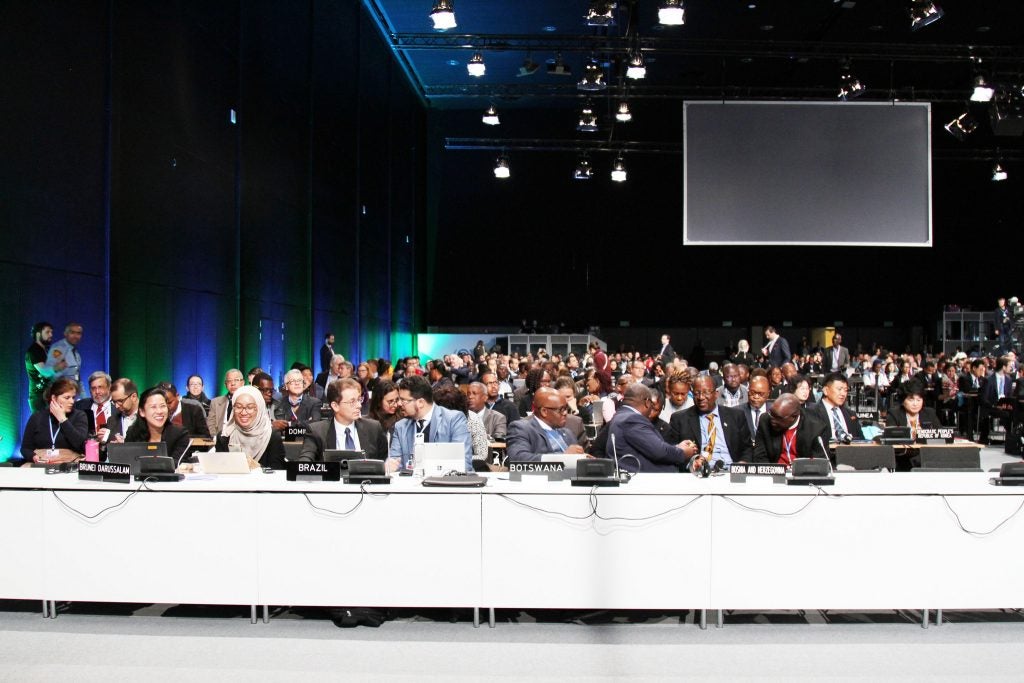Agriculture negotiators arrived in Katowice, Poland eager to get to work on the Koronivia Joint Work on Agriculture (KJWA) during COP 24. The KJWA is a UNFCCC initiative directing the Subsidiary Body for Scientific and Technological Advice (SBSTA) and the Subsidiary Body for Implementation (SBI) to jointly consider how to tackle agriculture issues in the context of climate change.
Following the creation of the KJWA roadmap during the May 2018 intersessional in Bonn—which laid out an agenda of workshops, topic submissions, and workshop reports every six months between the 2018 intersessional and the end of 2020—negotiators agreed to continue their joint work on addressing issues related to agriculture, beginning with the first in-session workshop during COP 24 in Katowice. Over the course of the first week of the COP, it became clear that the negotiators were determined to keep the momentum going.
The first item on the agenda: negotiators discussed the modalities for implementation of the outcomes of the five in-session workshops on issues related to agriculture and other future topics, such as exploring potential synergies and ways to support advanced agriculture practices and technology, which may arise from this work.
During this workshop, the constituted bodies (CBs)—bodies of the UNFCCC that provide technical input and expertise to advance the implementation of the Convention, the Kyoto Protocol, and the Paris Agreement—provided an overview of their work and how it could further the objectives of the KJWA. The Adaptation Committee, for example, agreed that, although its mandate is to provide technical advice to all, there is a need to bridge the gap between the general and the specific. Another CB, the Least Developed Countries Expert Group, discussed how it is carrying out its mandate through providing guidelines for National Adaptation Plans, training, and sector-specific supporting materials.
From the interventions of Parties and observers, like the coalition of land use experts that EDF is a part of and the North American Climate Smart Agriculture Alliance (NACSAA), it became clear that:
- Many gaps and key linkages remain to be addressed with regards to how the CBs can contribute to the KJWA
- More exchange of knowledge and resources is needed
- More focus should be directed toward food security, resiliency, livelihoods, mitigation safeguards, gender equality, and risk management
- The gap between the global and local context needs to be bridged so that global processes connect to decision makers on the ground
- The process needs to maximize transparency and inclusiveness to broaden representation of key stakeholders, like farmers and environmental civil society organizations
Taking note of these interventions, the co-chairs produced draft text the night before the final session. The text cited, among other things, that the SBI and SBSTA welcomed the submissions from Parties and observers to serve as input to the workshop, invited the CBs to contribute to the work of the KJWA, asked Parties and observers to submit views on the topics of the next two workshops to be held in June (one is focused on adaptation, adaptation co-benefits, and resilience and the other on improved soil carbon, soil health, and soil fertility), and would continue to consider New Zealand’s proposal to host a workshop related to the Koronivia road map.
When the co-chairs presented the text to Parties the following afternoon, there were no objections signaling that Parties had reached consensus on the final text.
Although the conclusions procedural in nature, the fact that Parties were able to come together and produce broadly agreed upon text reinforced the energetic and optimistic tone of the negotiations, and provided a positive sign that they are intent on continuing the momentum for the KJWA and tackling the concerns listed above. While it is still unclear what the ultimate KJWA “modalities” will be or how these modalities will support action in agriculture, what is important is that the work is continuing full-steam ahead. In the lead up to the next KJWA workshops to be held in June, the report on the first workshop will be circulated, and Parties and observers will have the opportunity to submit their views on adaptation and resilience, and on soil health and water management – the topics of the June workshops.
The KJWA has been instrumental in highlighting both the importance of agriculture to achieving emissions reductions and the connections between climate change and agriculture. Ensuring that the KJWA is implemented, and that Parties continue to focus on how to address the vulnerabilities of agriculture to climate change and approaches to addressing food security, is essential. EDF will submit views, and continue to explore how to fill essential gaps, answer key questions, and assess the needs to continue the momentum towards the implementation of the KJWA.










